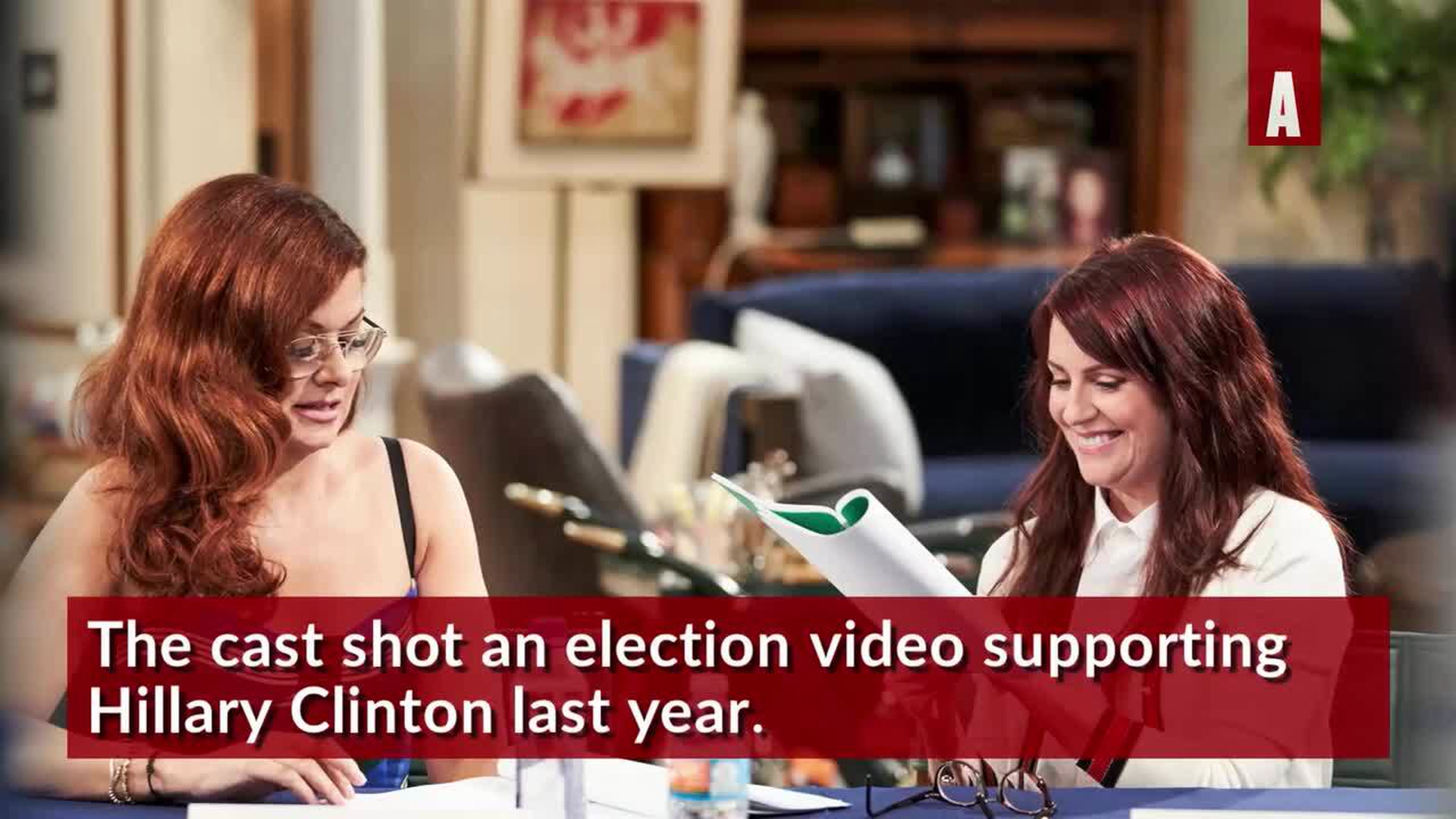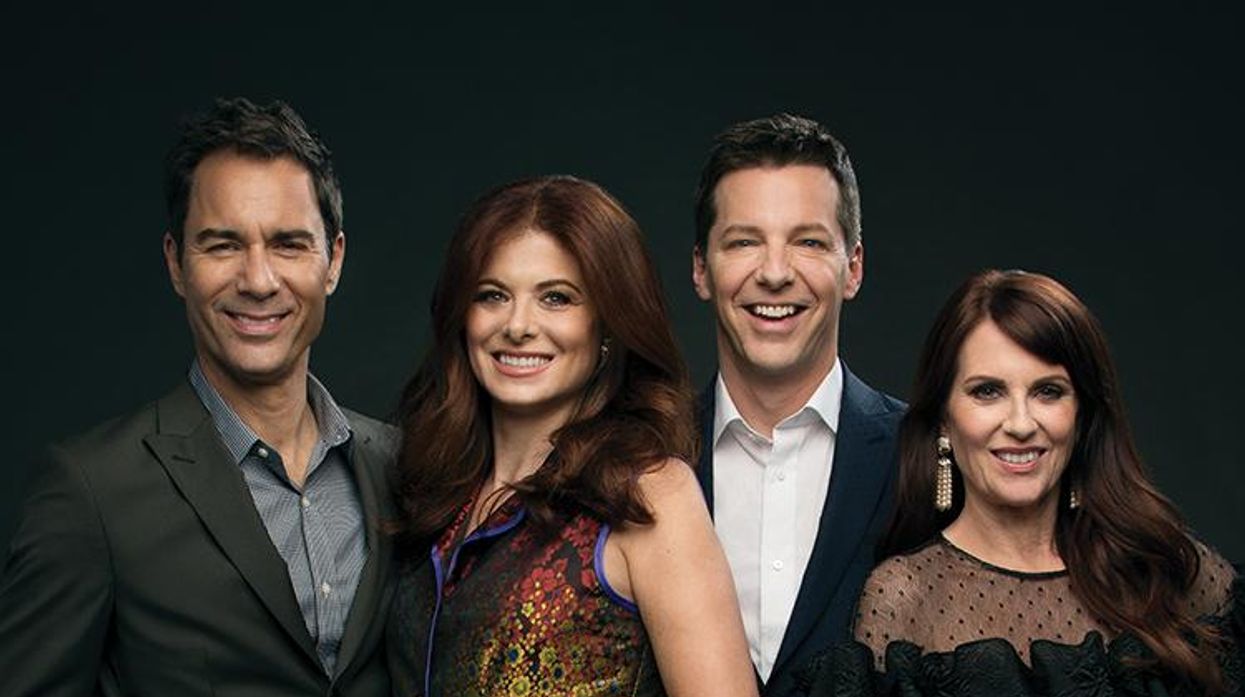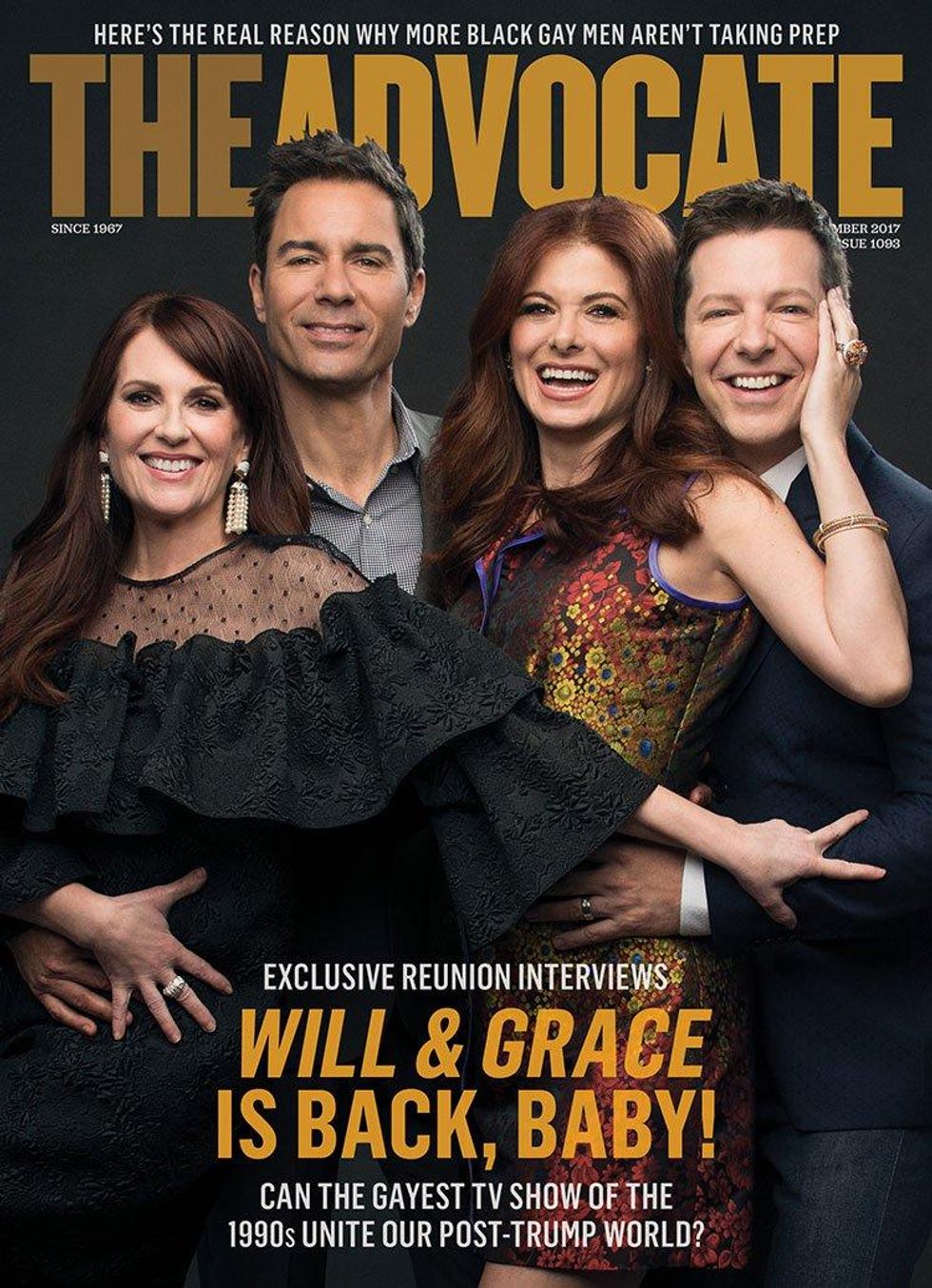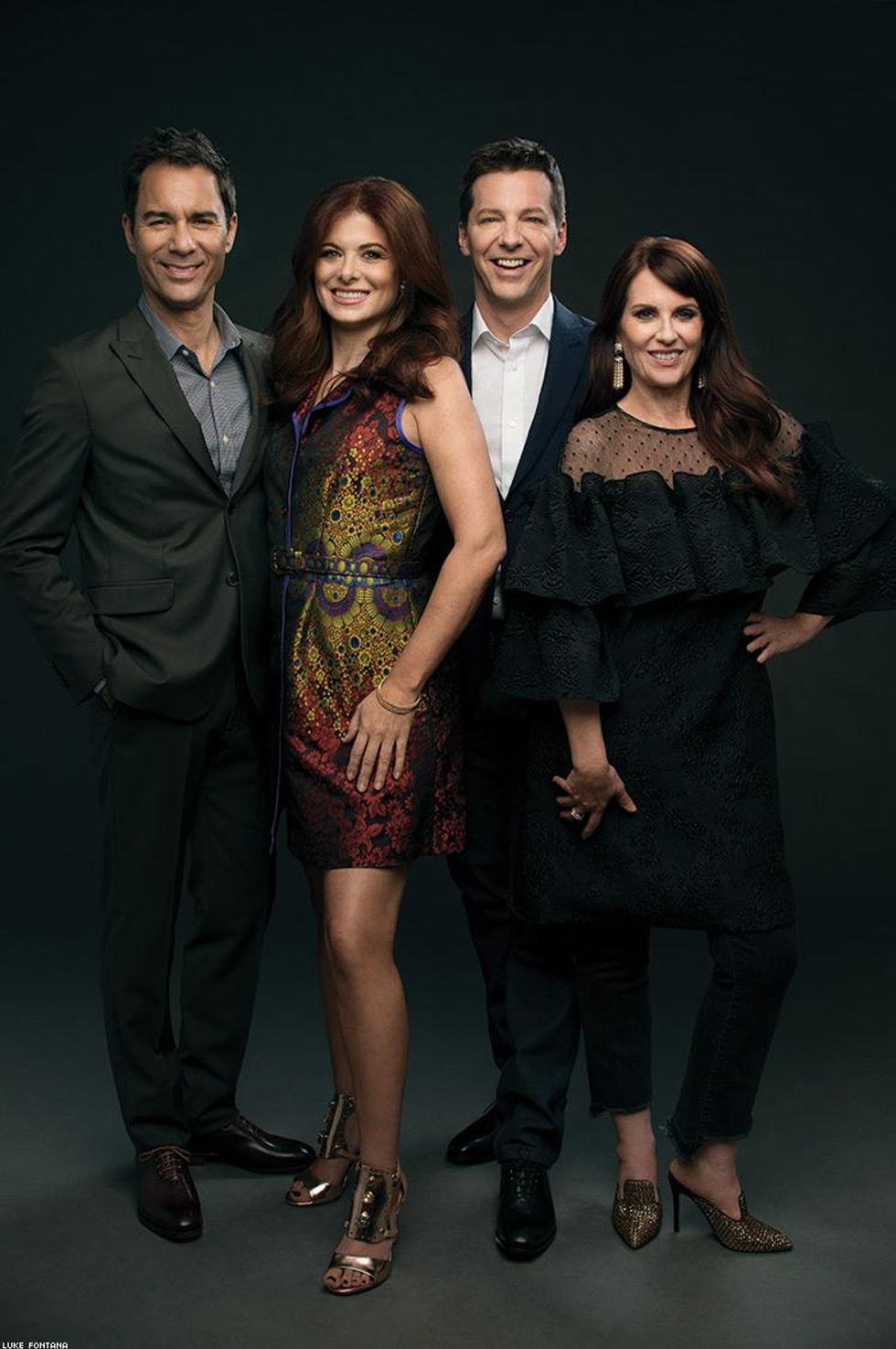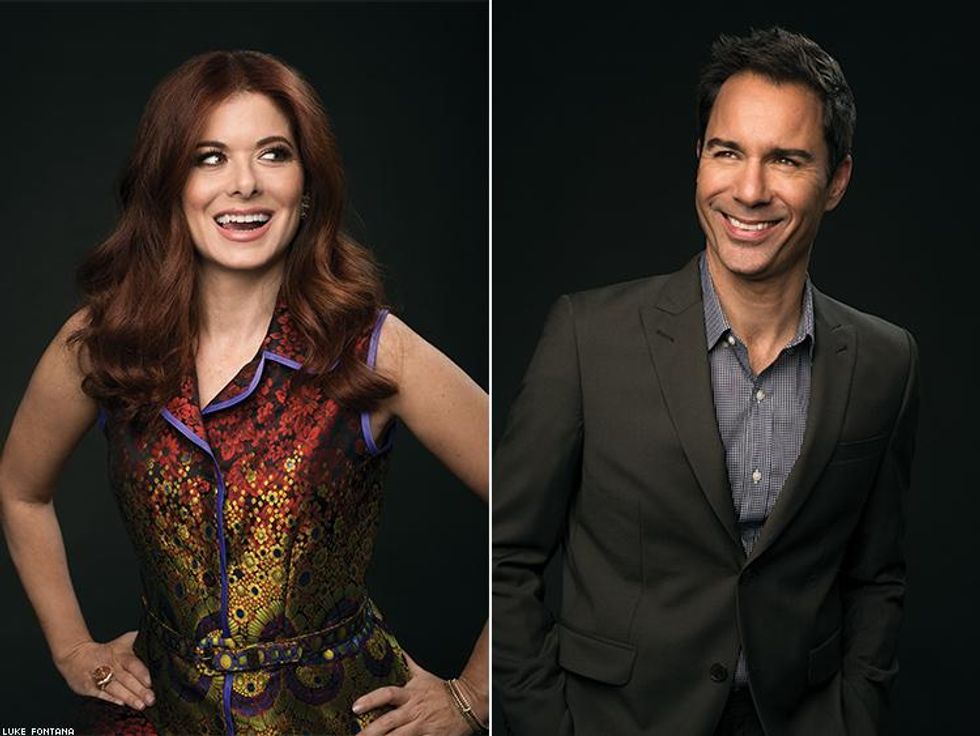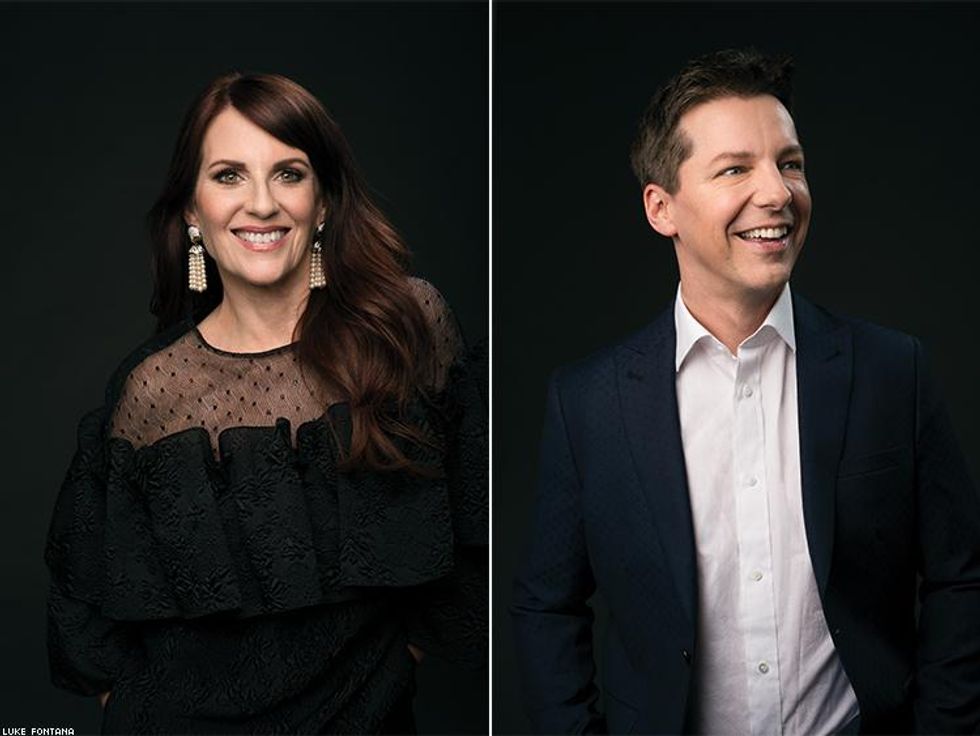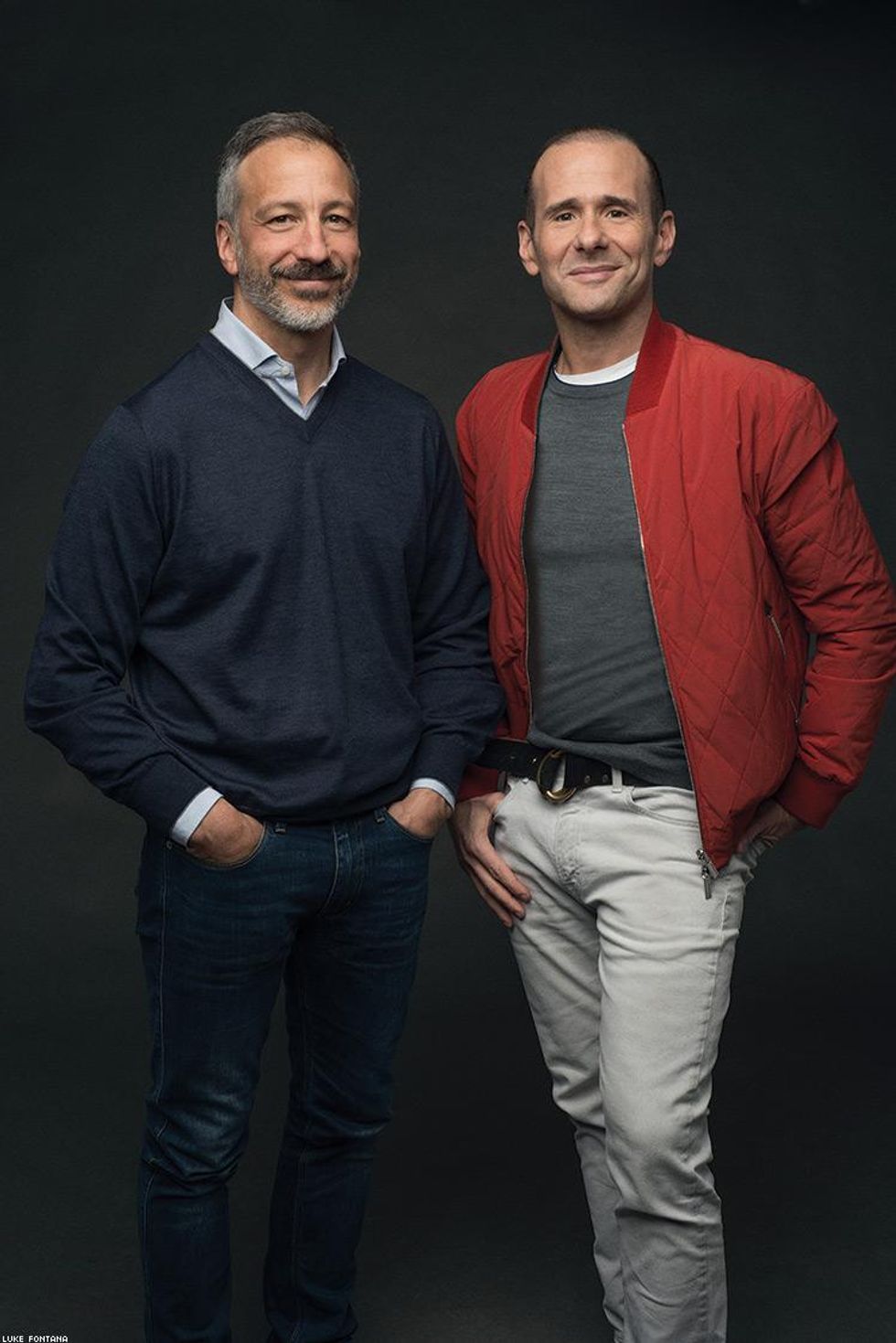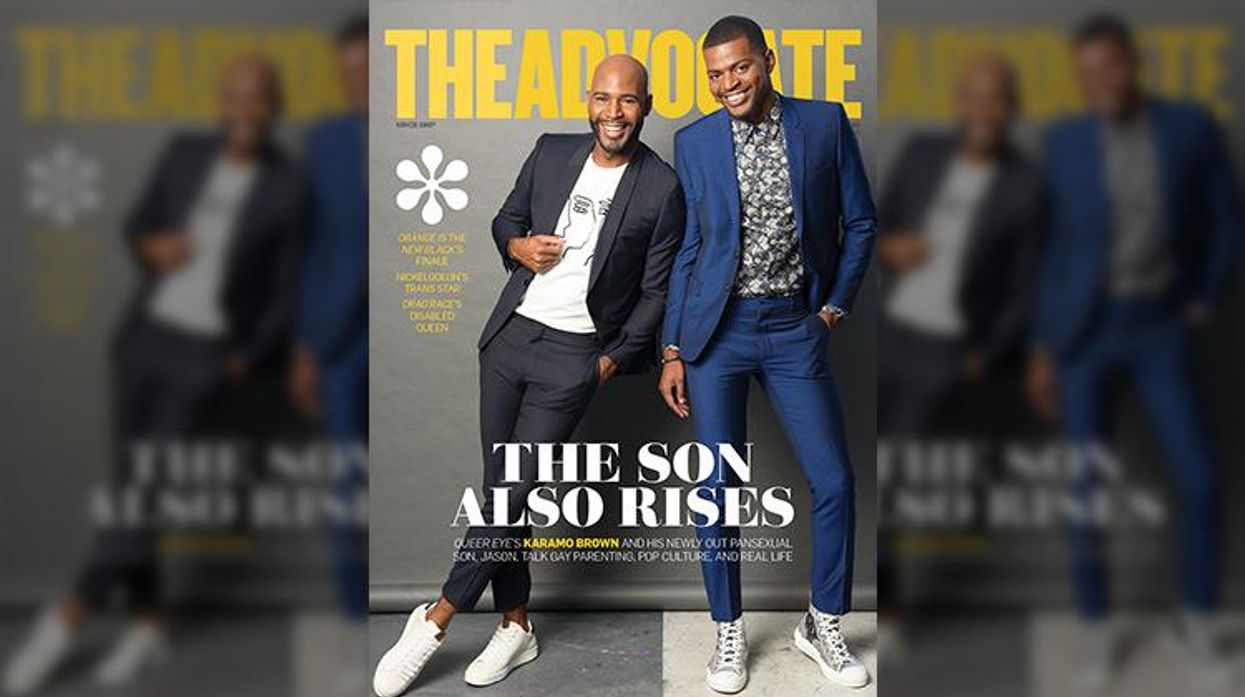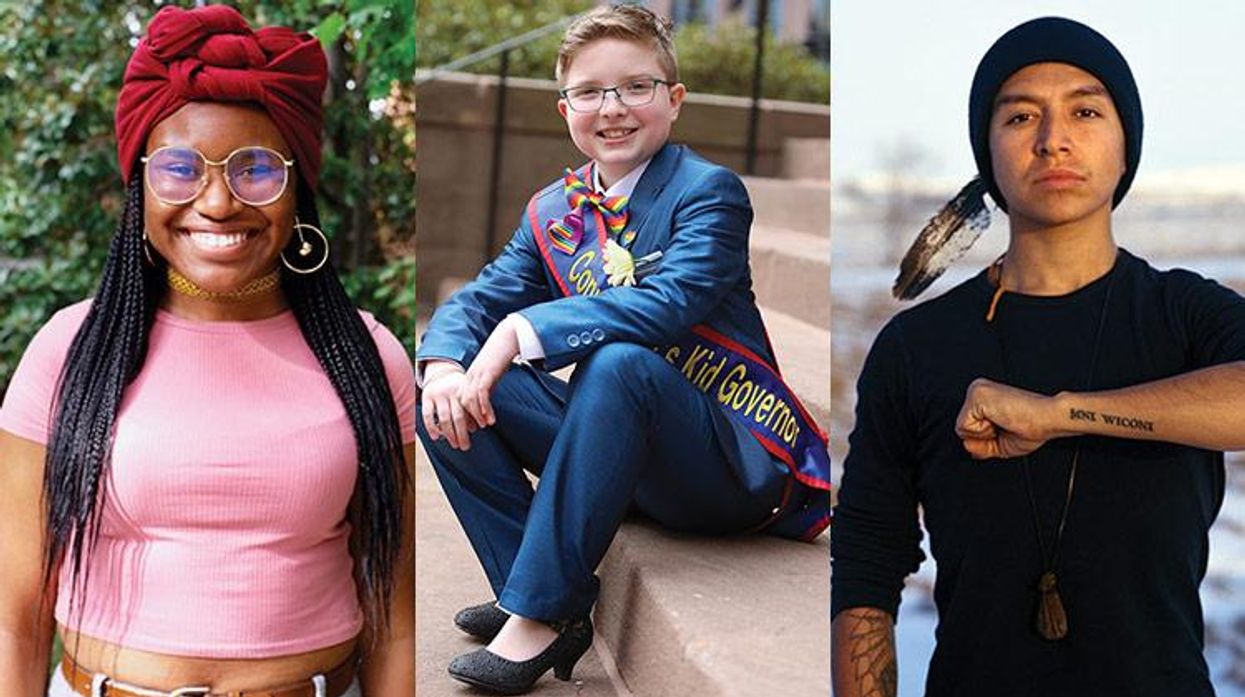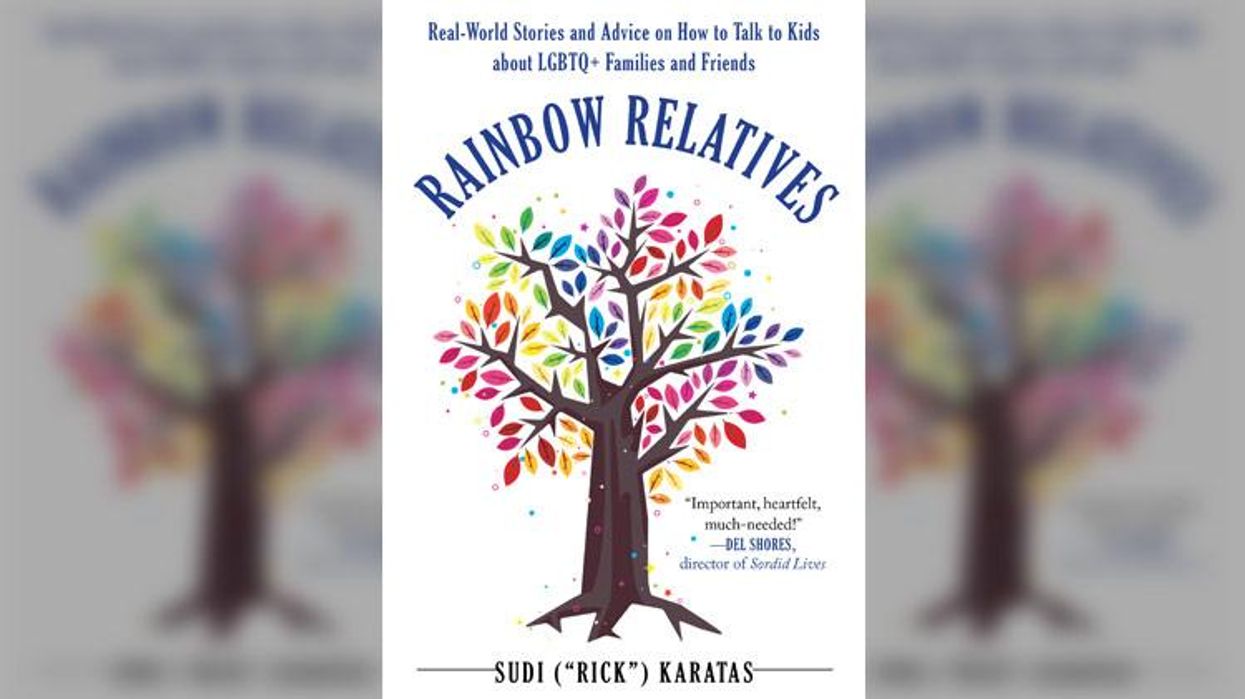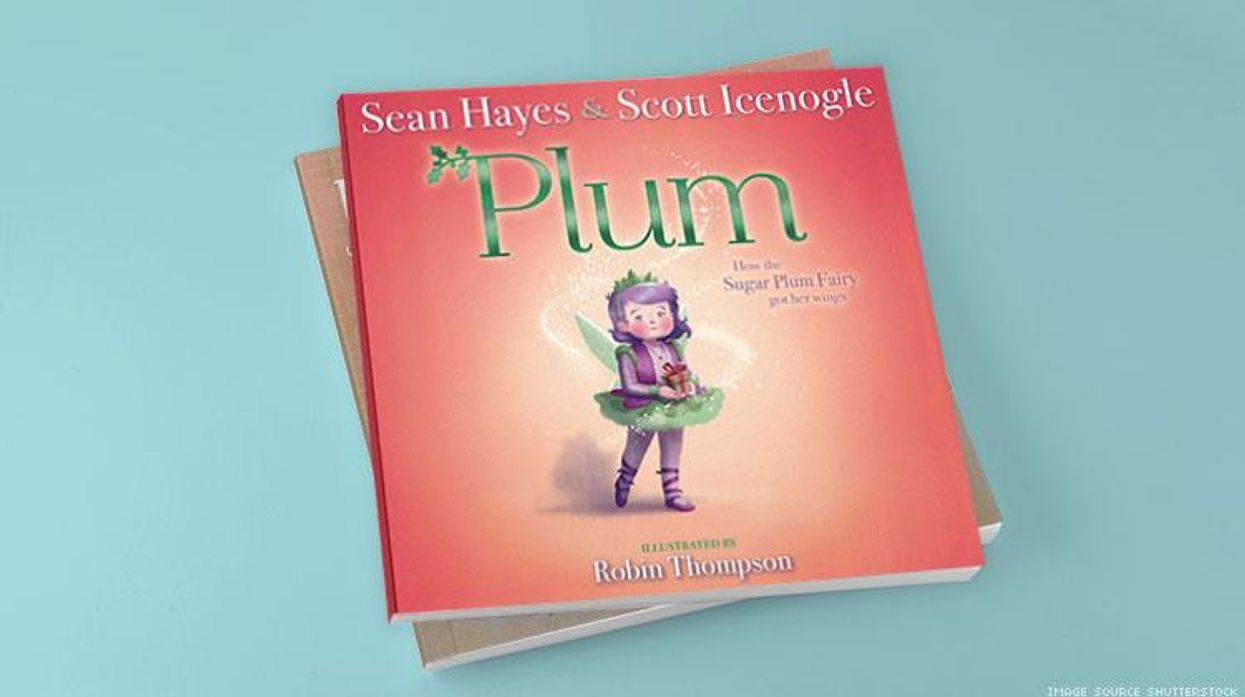In September 2016, 150 unsuspecting audience members filed into a basement at CBS Studio Center in Studio City, Calif. They handed over their phones and signed nondisclosure agreements -- measures to protect the secrecy of a new production called Hot Food (or so they were told).
Moments later, the curtain rose, and there they were: Will, Grace, Jack, and Karen, standing in Will's apartment. By sheer coincidence, Will & Grace -- NBC's retired hit sitcom that centered on the friendship between two gay men, a bisexual woman, and an ally -- had premiered 19 years prior, to the day.
For the audience, however, the series premiere could have been yesterday. Original props from the show were in place -- an astounded Eric McCormack later recounted finding note cards, brought to set in 1998 by Donny Osmond, stashed in a box. The characters themselves, revived by McCormack, Debra Messing, Sean Hayes, and Megan Mullally, appeared transported through time. The crowd went wild.
"The reaction from the audience in the house that night was absolutely incredible," recounted Max Mutchnick, Will & Grace's gay cocreator. Mutchnick was the mastermind behind Hot Food -- his codename for "Vote, Honey," a mini-episode encouraging voter turnout for Hillary Clinton in the 2016 presidential election. Primarily written by Mutchnick and fellow Will & Grace cocreator David Kohan, the production came together swiftly, spurred by the need to relocate the set after a period of stewardship by Emerson College, Mutchnick's alma mater.
The codename was an inside joke for the Will & Grace team, a reference to a phrase used by the chef, Sandy Flowers, to announce that lunch was ready. "Everybody would go running" when Flowers yelled, "Hot food!" said Mutchnick, who called out the phrase with a Southern drawl.
Fans also came running when the clip was released later that month. It went viral, and millions demanded to see more. Clinton would go on to lose the election to Karen's preferred candidate, Donald Trump. But "Vote, Honey" won a renewed interest for Will & Grace.
Mullally herself sensed the need for a reboot, even before "Vote, Honey" was released. After first reading the script, she picked up her phone and sent Mutchnick an email.
"Why can't we do the show again?" Mullally typed.
"We can," he replied.
In May 2017, a string of black cars pulled up to the studio in New York City near the Garment District. One by one, Messing, Mullally, Hayes, and McCormack arrived, and were ushered to an industrial elevator and taken to the third floor, alongside a small army from NBC Universal.
At this point, the reality of Will & Grace's return had finally crystallized for fans. After a period of negotiations, NBC confirmed it had picked the series up for the 2017-18 season. It later optimistically increased its order to 16 episodes -- and then added a second season. The show has a September 28 premiere date and the coveted Thursday 9 p.m. time slot.
That May morning, the actors performed a musical number at Radio City Music Hall. There, NBC staged its upfront presentation -- an event to drum up advertiser interest before a TV season. A soon-to-go viral clip of the cast's song was also released online. In the fantastic number, McCormack convinces Messing to join the Will & Grace revival by bringing her to the set. As in the election video, nothing had changed -- even Jack and Karen, lying on the sofa under a sheet, were still there. They burst into song and declared, "We've come home at last."
In the real world, no musical extravaganza was required to sway the cast of Will & Grace to return. But this desire for a homecoming was no fiction.
"I've never felt more comfortable in a place than I've felt standing in that kitchen," said McCormack, the other three cast members nodding by his side. "It felt like home when we were together."
"It was a very emotional thing walking on the set for the first time in 10 years and seeing every prop in place," Messing said.
Viewers agreed. Over 25 million people have viewed the Facebook video trumpeting the show's return. After a tumultuous election season, fans expressed a need to laugh and distract themselves from their cares.
"People missed it and craved it," said Hayes, 47 -- himself included. "It was so fleeting back then. I was so young. We were all so young -- and still are. But for me personally, it's a wonderful, grand way to appreciate it all over again."
ABOVE: Debra Messing and Eric McCormack have always been the heart of the show, portraying an enduring cornerstone of the LGBT community: a gay man and his straight, female best friend.
The actors had just wrapped up the flurry of a photo shoot. For hours, the studio space was filled with the lively bustle of publicists, producers, makeup artists, assistants, photographers, and editors. The Will & Grace stars were still dressed in their attire from the shoot. The men wore suits without ties, in the favored style of Barack Obama. Messing glimmered in a dress of red, orange, black, and purple. Mullally chose a black dress with a dramatic frill. A trim McCormack had just snagged a piece of cake from the studio's own kitchen, remarking how he "can't believe" he was eating dessert at a photo shoot for The Advocate.
It was more than nostalgia that had convinced these actors to resume their iconic roles. The joyful response to the election video was key. And there were other issues to consider. "Lighting!" joked McCormack. "Money!" said Mullally. Mutchnick laughed. "I never thought we should have stopped the first time," Mullally declared in a serious tone.
"Look at all the things you've got to do over these years that have been wonderful. And now we're coming back!" Messing acknowledged. "Good point," Mullally conceded, whose interim productions included 30 Rock, Parks and Recreation, Bob's Burgers, and G.B.F.
There was also the election.
"Because of what was happening in our country and what has happened since the election, it felt necessary and urgent to me," said Messing. Earlier this year, the actor-activist gave a fiery speech at the GLAAD Media Awards, urging Ivanka Trump to advocate for marginalized people. "It's not enough to simply say that women's issues are important to you. It's time to do something," she told the first daughter.
So, is Will & Grace part of the Resistance?
"Yeah!" declared Mullally and Messing in unison.
"We shot that election video thinking, hilarious, because Hillary's going to win, so who cares?" Mullally said. "It's just an extra thing we were doing just for fun. And who could have known Donald Trump would win?"
"It's funny, though, to think that these characters leading normal lives like any other human being would be considered resisting. What are we resisting? If resistance is happiness, then we're the Resistance," Hayes said.
"The sad and crazy part is this should all be de rigueur by now," said McCormack, marveling at how a series with queer leads can still be revolutionary in 2017. In today's climate, he said Will & Grace "feels more necessary than ever."
"Just the very act of doing this feels like we're resisting, taking a chance on America again and seeing if they're going to show up," McCormack added. He referenced the challenges of a new media landscape, where a clip of a laughing Chewbacca-masked mom accrued millions more views than their election video.
But the cast is hopeful that America will show up -- and that the progress Will & Grace helped usher into the country's culture will not be rolled back.
"You can't put the toothpaste back in the tube. And people -- many, many people -- around the world have reached a certain degree of enlightenment and continued to grow and evolve. That can't be stopped," Mullally declared.
"White men in the government, you're on your way out," said Mullally, pointing out how white men account for a declining percentage of the U.S. population. "So here's your hat, what's your hurry?"
The cast bursts out laughing. "That has to be in there," Messing nudged.
Will & Grace had its own role to play in helping society reach "a certain degree of enlightenment." From 1998 to 2006, the sitcom broadcasted queer characters during another conservative period: 9/11, the Iraq War, and the majority of the George W. Bush administration. Every episode was directed by James Burrows, who is also returning for the reboot.
Former vice president Joe Biden, while announcing his support for marriage equality on NBC's Meet the Press in 2012, had his own assessment of this impact. "I think Will & Grace probably did more to educate the American public [on LGBT issues] than almost anything anybody has ever done so far," he said.
For the cast of Will & Grace, Biden's statement was "a moment of validation," Messing said. "I just was gobsmacked. Besides the birth of my son, I think that was the proudest moment of my life."
Mullally called it a "moment of clarity" for the actors, who in 1998 couldn't conceive of their ability to move the needle for social change, let alone marriage equality. Hayes agreed: "That [statement] makes you realize, I was involved in something bigger than any of us," he said.
Mutchnick and Kohan were "proud" that Biden would credit Will & Grace with changing hearts and minds about gay people. "If the show had anything to do with that, it's incredibly gratifying," Kohan said.
Afterward, the cocreators sent a Will & Grace box set to Biden with a note: "We assume you already have this, so you should take your old set, give it to the president, and you should keep this new set," it read, recounted Mutchnick. At the time, President Obama had yet to "evolve" to support same-sex marriage. That phrasing and timing still rankles Mutchnick.
"I've always found the statement of 'evolving' on the issue to be totally homophobic," he said. "I think it's as bad as any insult you can make to a minority. Could you imagine if I ever said to the president of the United States that I was evolving on race issues?"
ABOVE: Having bi actor Megan Mullally and gay actor Sean Hayes portray characters audiences have known for years adds more than just authenticity to the show.
Now, the United States has a far more conservative administration, whom many fear will devolve LGBT rights. Would the cocreators send President Trump a box set, to change a heart and mind once again?
"I don't think there's a heart and a mind to win over in the White House right now," Kohan said.
"I'm not looking forward to any attention from this president," said Mutchnick, adding, "I don't think it would be good for the show." Trump has a history of hostile engagement with the media, including NBC. He regularly tweeted about the last season of The Apprentice, where he served as an executive producer. Trump also targeted Saturday Night Live, which regularly lampoons the president.
And Will & Grace, having aligned itself with Clinton in the campaign video, may stir far-right furor on social media, presidential or otherwise. The cast said they refuse to engage with trolls. "I just block them," said Messing, who called engaging with them historically a "disappointing" and "dark" experience.
But according to its co-creators, Will & Grace does not have a political agenda. "We went out of our way to not get caught up in anything that was going on socially, politically, legally," said Mutchnick of the show's original run. The queer identities of the characters weren't acts intended to change attitudes. Rather, they were "drawn from our lives and our situations and our experiences," Kohan said.
"We didn't want to write about ideas. We wanted to write about characters," said Mutchnick. The cast also agreed that the show's focus on characters was the secret to its magic.
"This show is about friendship. And I think first and foremost, this show is a comedy and it was successful in being a comedy," stated Mullally. She said the characters' sexuality "was one aspect of them as human beings. We never politicized the issue. It was just part of life."
"We have chemistry. That's just a fact, and you can't force that and you can't predict it," Messing added. "And then you have the writing that found that brilliant, beautiful balance that kept it funny all the time, and made every one of these characters lovable."
The actors traveled their own roads in raising LGBT visibility. In a 1999 interview with The Advocate, Mullally declared, "I consider myself bisexual, and my philosophy is, everyone innately is." She and her husband, Parks and Recreation star Nick Offerman, have been together for 17 years and often do very political, sexy, and progressive comedy together.
Hayes' own ascent to an out icon was no crystal stair. Many in the LGBT community had been critical of Hayes for not coming out during Will & Grace's original run. He first discussed his sexual orientation publicly in a 2010 interview with The Advocate, stating, "I am who I am. I was never in, as they say. Never." Afterward, Hayes discussed how he regretted his silence, telling the Los Angeles Times in 2013, "I didn't know how to handle the responsibility of speaking for the gay community. I always felt like I owed them a huge apology for coming out too late."
Today, Hayes, who married his partner Scott Icenogle in 2014, reflects on the meaning of starting Will & Grace anew. For the first time, he will portray Jack as an out gay actor. "It makes me very proud to be part of something that helps the community and brings more light to the topic," he said.
"I should have done it in 1998. I was too afraid," said Hayes on coming out. "I'm out, proud now. And I was before, I just wasn't out to the press."
Mullally revealed she had her own strategy in circumnavigating questions about Hayes' sexuality during Will & Grace's original run. "People would always ask me if you were gay, and I'd be like, 'Well, I had sex with him, so -- We're not really sure. I just know that he's been inside me," she said.
"Still trying to get out!" Hayes joked.
"I do feel like it should be the person's choice to come out in their own time, for their own reasons," Mullally said. "I didn't like it when Sean was being pressured and badgered and belittled and criticized for not coming out. I didn't think that was right."
"Even in The Advocate, they were a little nasty," Hayes said. Notably, The Advocate ran a fake Q&A before Will & Grace's finale called "Sean Hayes: The Interview He Never Gave." The piece spliced together quotations regarding Hayes' identity from other sources, after repeated requests for an interview were denied.
"A lot of people want you to come out on their terms instead of individuals's terms. But everybody's different," Hayes said.
Of course, the world has changed significantly since 1998. Messing said how "spectacular" it was to engage with a young generation that embraces LGBT peers. But Hayes cautioned against declaring victory. "It's not so rosy for everybody, and we still have a ton of work to do, which is also why I'm very proud the show's coming back even now," he said. "I always wished it would go on forever, because it seems to be you have to constantly educate people about the normalcy of any diverse individual."
"It means a lot to me," Hayes said of being an out man on television. "It means a lot to me that I may not be a singular voice, but I'm proud to be part of that chorus of the gay community. I don't have the DNA to be the spokesperson for any group of people. Nope. That's the worst mistake anybody could have [made]. Because I just don't have the makeup of standing on a soapbox."
ABOVE: Will & Grace's cocreators David Kohan (left) and Max Mutchnick (one gay, one straight, both married) have quietly blazed a trail for LGBT equality, even though most of the accolades go to the stars behind the characters they created.
How will Will & Grace adapt to 2017 -- in an era where Hollywood has raised its standards of intersectional representation? While the cast wasn't privy to plot details at the time, Messing said the chance to spotlight more marginalized groups was a motivating factor for her return.
"The dialogue has opened in a beautiful way, and now there's an opportunity for us, in a way, to do it again for people who still feel unrepresented," she said.
McCormack said they have nothing but support from NBC, in terms of being queer on television. "Any fears they would have had 20 years ago, putting a show like this on the air? Now they say, 'Go ahead. Families will be watching. Be gay. Be gay!'"
Bob Greenblatt, the out chairman of NBC Entertainment, confirmed that he has no problem calling Will & Grace a "gay show." This is significant. Even today, networks shy away from embracing this label due to a fear of alienating straight viewers.
[RELATED: The Advocate's Interview With Bob Greenblatt]
Mutchnick and Kohan declined to reveal any details about how race and identity might figure into the upcoming season, other than, "We are not going to go out of our way to meet a quota," said Mutchnick. "I do feel like Rosario counts, doesn't she?" he added, referencing the feisty Latina maid played by Shelley Morrison. (Morrison later confirmed that, sadly, she would not be returning to the show.) Kohan said the show will continue to focus on the four principal characters -- who give the series a "sound" viewers associate with "a happier time" -- as opposed to storylines about "the new coalitions and the new look of America."
If indeed Will & Grace helped change hearts and minds for marriage equality in its first run, what do its creators hope it might accomplish with its second?
"Half of this country hates the other half of the country. I would love for it, if anything, to create a sense that you can be kind to one another even if you disagree," Kohan said. Mutchnick agreed, adding how the presence of Karen, a Trump supporter, in this friendship might open dialogues and set a "great example" for others.
But at the end of the day, the cocreators and cast want Will & Grace to continue what it has always done: make audiences laugh.
"I just hope that we make them laugh so hard that they pee," said Messing.
"I just really wish I could show you my tits right now," smiled Mullally.
